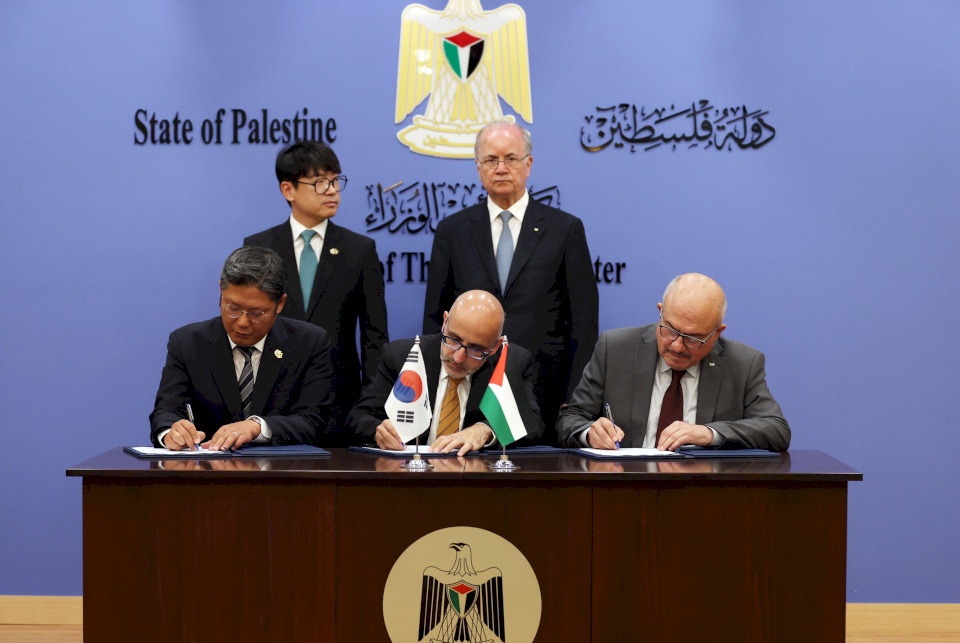
$24 Million.. Palestine Signs Two Agreements with South Korea to Enhance Technology and Preserve Heritage
SadaNews - The Government of the State of Palestine and the Republic of South Korea signed two important agreements today, Thursday, at the Prime Minister’s office in Ramallah. The first agreement aims to enhance Palestine's capabilities in the field of innovative technology and digital transformation through a capacity-building project in research and development for innovative technology and digital transformation in Palestine, while the second focuses on preserving the cultural heritage in the town of Sebastia in the West Bank, under the patronage and presence of Palestinian Prime Minister Mohammad Mustafa.
Under the agreements, the Republic of Korea has allocated 15 million dollars for the capacity-building project in research and development for innovative technology and digital transformation in Palestine, and 9 million dollars for the integrated regional development project in Sebastia, reflecting the commitment of both sides to support the digital economy and sustainable development.
The first agreement was signed on the Palestinian side by the Minister of Planning and International Cooperation, Dr. Istifan Salama, and the Minister of Education and Higher Education, Dr. Amjad Barham, while on the Korean side, it was signed by Mr. Mingong Kim, Director of the Korea International Cooperation Agency (KOICA) office in Palestine, in the presence of the Korean representative to Palestine, Mr. Youngkol Ko. The capacity-building project in research and development for innovative technology and digital transformation in Palestine aims to establish the Palestinian Institute for Innovative Technology Research in Ramallah, enhance the scientific research system in Palestine by providing cloud services for researchers and academics, prepare distinguished human resources through training programs and doctoral scholarships, and partnerships with universities and companies, and encourage the return of Palestinian expertise from abroad, in addition to enhancing partnerships between the academic and private sectors.
The integrated regional development project in Sebastia was signed on the Palestinian side by Dr. Istifan Salama and the Minister of Local Government, Dr. Sami Al-Hajawi, while on the Korean side, it was signed by Mr. Mingong Kim, in the presence of the Korean representative to Palestine, Mr. Youngkol Ko. The project aims to improve and invest in the tourism potentials of Sebastia by preserving its cultural heritage, stimulating the local economy through community development initiatives, and enhancing the social and economic resilience of vulnerable groups, especially women and children, by establishing a center for selling handicrafts and visitor experiences using vacant traditional heritage homes, operating cooperatives, and savings groups for sustainable economic activities, and creating a multi-purpose community center and setting plans for activities that ensure its effective use.
Prime Minister Dr. Mohammad Mustafa said: "The projects signed today align with the government’s programs to localize services and economic transformation programs, especially since they have a clear impact on local governance through the Sebastia project, on the education sector through the artificial intelligence program, and developing the necessary human resources, launching initiatives and artificial intelligence programs in the coming phase, and it also supports our other program in digital transformation, which has already begun to materialize on the ground through more uses of this modern technology to provide services to citizens."
The Prime Minister added: "Our people are in a race against time and against the occupation; everyone wants to establish their narrative and vision on the ground. All attempts by the occupation seek to prevent us from embodying our state on the land, and in return, we are working with friends from all over the world, including friends from Korea, to realize our people's right to establish their independent state, because this is a natural right supported by all honorable and friendly people in the world. We recall that Palestine's political and diplomatic program is achieving many multifaceted accomplishments, as the consensus that occurred at the international conference in New York a few weeks ago is a clear testament to the world's interest in supporting the Palestinian leadership's efforts to achieve and embody our state on the ground."
For his part, the Korean representative to Palestine, Mr. Youngkol Ko, said: "Through these two projects, we aim to revive hope and drive renewed momentum in Palestine, while laying a strong foundation for continued cooperation in the coming years. We also aspire to contribute to establishing lasting peace and stability in Palestine, reaffirming Korea’s commitment to being a key partner in this endeavor."
Minister of Planning and International Cooperation Dr. Istifan Salama confirmed the depth of bilateral relations with the Republic of Korea and the importance of enhancing cooperation in the fields of development and strategic planning, appreciating Korea's role in supporting joint projects and building bridges of cooperation that serve the mutual interests of both peoples.
For his part, Mr. Mingong Kim, Director of the KOICA office in Palestine, expressed his pride in signing two important agreements today that reflect the Republic of Korea’s continuous commitment to supporting development priorities in Palestine and enhancing partnership for a better future.
The implementation of the integrated regional development project in Sebastia will extend from 2025 to 2029. As for the capacity-building project in research and development for innovative technology and digital transformation in Palestine, it will be implemented from 2025 to 2031. These projects represent a qualitative leap in the course of Palestinian-Korean cooperation, contributing to enhancing the resilience of the Palestinian community and achieving comprehensive and sustainable development.

The Problem of Shekel Overcrowding Worsens.. Fuel Station Owners Threatened with Closure o...

The Palestinian Economy at a Crossroads: 4 Files Awaiting Resolution

Hebrew Economic Newspapers Reveal Reasons for Dollar Weakness Against Shekel Strength Rise

Dutch Airline KLM Announces Resumption of Flights to "Israel" in an Exceptional Operating...

Deal Between the Israeli Ministry of Defense and Elbit Systems for Purchasing Ammunition W...

Currency Exchange Rates Against the Shekel on Tuesday (January 27)

سلطة النقد تحشد الرأي العام الدولي حول ضرورة معالجة أزمة تكدس الشيكل والإفراج عن أموال الم...
